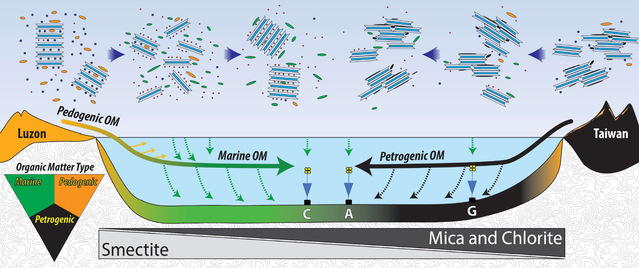T. M. Blattmann1*†, Z. Liu2*, Y. Zhang2, Y. Zhao2, N. Haghipour1,3, D. B. Montluçon1, M. Plötze4, T. I. Eglinton1
1 Geological Institute, ETH Zurich, Zurich, Switzerland.
2 State Key Laboratory of Marine Geology, Tongji University, Shanghai, China.
3 Laboratory of Ion Beam Physics, ETH Zurich, Zurich, Switzerland.
4 Institute for Geotechnical Engineering, ETH Zurich, Zurich, Switzerland.
*Corresponding author. Email: thomas.blattmann@erdw.ethz.ch (T.M.B.); lzhifei@tongji.edu.cn (Z.L.)
Abstract: First-order relationships between organic matter content and mineral surface area have been widely reported and are implicated in stabilization and long-term preservation of organic matter. However, the nature and stability of organo-mineral interactions and their connection with mineralogical composition, have remained uncertain. Here, we find that continentally derived organic matter of pedogenic origin is stripped from smectite mineral surfaces upon discharge, dispersal, and sedimentation in distal ocean settings. In contrast, organic matter sourced from ancient rocks that is tightly associated with mica and chlorite endures in the marine realm. These results imply that the persistence of continentally derived organic matter in ocean sediments is controlled to a first order by phyllosilicate mineralogy.

Full Aritical:
https://science.sciencemag.org/content/early/2019/10/02/science.aax5345


